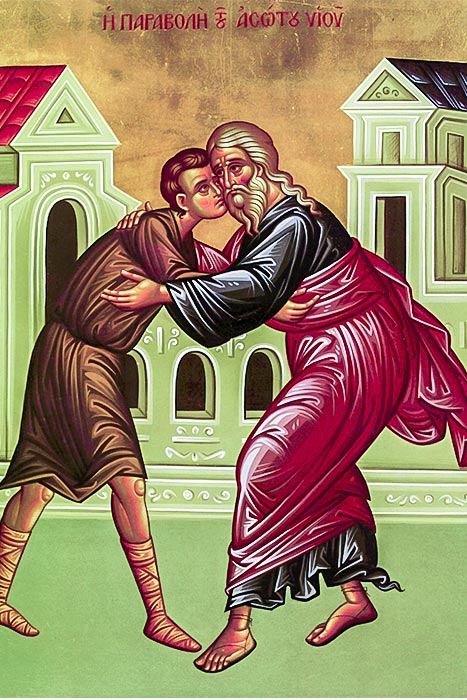|
Συναξαριστής |
16 Φεβρουαρίου όνομα: ΚΥΡΙΑΚΗ ΤΟΥ ΑΣΩΤΟΥ (*) (Κυριακή του Ασώτου) |
 |
| ΚΥΡΙΑΚΗ ΤΟΥ ΑΣΩΤΟΥ
Ή παραβολή του «Άσωτου Υιού» είναι γνωστή. Ομιλεί για ένα πλούσιο νέο ο όποιος άσωτα κατασπατάλησε την περιουσία του σε χώρα μακρινή και στο τέλος κατάντησε να βόσκει χοίρους. Τότε μετανόησε και επέστρεψε στον πατέρα του, πού τον δέχθηκε με άπειρη αγάπη και στοργή. Ή παραβολή είναι ανεξάντλητη σε νοήματα, αφού, όπως λέγεται, ολόκληρο το έργο της Θείας Οικονομίας ευρίσκεται μέσα σ' αυτή. Το βαθύτερο νόημα της παραβολής είναι τετραπλό: α. Ή απελπιστική κατάσταση στην οποία φθάνει ο αμαρτωλός. β. Ή ανάγκη μετανοίας και τα σωτήρια αποτελέσματα της. γ. Το μέγεθος της θείας Ευσπλαχνίας στην οποία μπορούν να στηρίζονται καί οι πλέον αμαρτωλοί, ώστε να μη φθάνουν ποτέ στην απελπισία. Κανένα αμάρτημα, όσο μεγάλο κι αν θεωρείται, δεν μπορεί να υπερνικήσει τη φιλάνθρωπη γνώμη του Θεού και δ. Ή αποφυγή του αισθήματος της αυτάρκειας του δικαιωμένου, όπως θεωρούσε τον εαυτό του ο πρεσβύτερος υιός. Εάν λοιπόν συναισθανθούμε την πραγματική πνευματική μας κατάσταση και με ειλικρίνεια ομολογήσουμε τα λάθη μας και την κατασπατάληση των ταλάντων πού μας χάρισε ο Θεός, θα καταλάβουμε ότι αύτη την Κυριακή Όλοι μας εορτάζουμε και όλοι, κατά κάποιο τρόπο, είμαστε άσωτοι υιοί, απομακρυνθέντες από τον «Οίκον του Ουρανίου Πατρός μας». SUNDAY OF THE PRODIGAL SON The Sunday of the Prodigal Son is the second Sunday of a three-week period prior to the commencement of Great Lent. On the previous Sunday, the services of the Church began to include hymns from the Triodion, a liturgical book that contains the services from the Sunday of the Publican and the Pharisee, the tenth before Pascha (Easter), through Great and Holy Saturday. As with the Sunday of the Publican and the Pharisee, the theme of this Sunday is repentance, and the focus on the parable of the Prodigal Son leads Orthodox Christians to contemplate the necessity of repentance in our relationship with our Heavenly Father. The name for this Sunday is taken from the parable of our Lord Jesus Christ found in Luke 15:11-32. The parable is the story of a man and his two sons. The youngest of the sons asks his father to give him his inheritance. The father does this, and soon after the son leaves and journeys to a distant country (vv. 11-13). After the younger son arrives, he squanders all of his possessions with “prodigal” living. Within a short period of time, he wastes everything. A severe famine comes, but he has nothing and falls into great need (vv. 13-14). He is able to find work feeding swine, but this does not improve his situation. The Scriptures say, “He would gladly have filled his stomach with the pods that the swine ate, but no one gave him anything” (vv. 15-16). The parable says that in the midst of his dire conditions, he came to himself. He realized that his father’s hired servants have enough to eat and food to spare, while he perishes with hunger. He says, “I will arise and go to my father and will say to him, ‘Father, I have sinned against heaven and before you, and I am no longer worthy to be called your son. Make me like one of your hired servants’” (vv. 17-19). He arose and returned to his father. But as he approached, his father saw him at a great distance. The father had compassion on his son, ran to meet him, embraced him, and kissed him. The son admitted his sinfulness and his unworthiness to be called a son, but in his joy at the return of his son, the father called his servants to bring the best robe, a ring for his son’s finger, and sandals for his feet. He also called for the fatted calf to be killed for a feast. He exclaimed, “For this my son was dead and is alive again; he was lost and is found” (vv. 20-24). While they were feasting and celebrating the return of the prodigal son, the older son comes and inquires about what is happening. He is told that his brother had returned and that his father has received him with a feast. The older brother becomes angry and will not go in to the feast. The father comes out and pleads with him, but the older son answers by saying he has been faithful to his father for many years and yet the father never gave him the opportunity for such feasting. He expresses his anger and jealousy over his brother who was received in such a manner after he squandered his inheritance (vv. 25-30). The father responds by telling his oldest son, “You are always with me, and all that I have is yours. It was right that we should make merry and be glad, for your brother was dead and is alive again, and was lost and is found” (vv. 31-32). The parable of the Prodigal Son forms an exact icon of repentance at its different stages. Sin is exile, enslavement to strangers, hunger. Repentance is the return from exile to our true home; it is to receive back our inheritance and freedom in the Father’s house. But repentance implies action: “I will rise up and go…” (v. 18). To repent is not just to feel dissatisfied, but to make a decision and to act upon it. |
| τέλος παράθεσης |
Οροι Χρήσης του κόμβου μας
|
Προστασία Προσωπικών Δεδομένων
|
 το γκρουπ μας στο FB
το γκρουπ μας στο FB
Copyright © www.eortologio.gr All Rights Reserved.
Copyright © www.eortologio.gr All Rights Reserved.
λέξεις για αποδελτίωση: εορτολόγιο, εορτολογιο, ΕΟΡΤΟΛΟΓΙΟ, γιορτη, γιορτή, ΓΙΟΡΤΗ, εορτή, εορτη, ΕΟΡΤΗ, συναξαριστής, συναξαριστης, συναξάρι, συναξαρι, γιορτάζει, γιορταζει, γιορτεσ, γιορτέσ, ποιός γιορτάζει, πότε γιορτάζει, ποιος γιορταζει, ποτε γιορταζει, υπολογισμός, κινητές, γιορτές, κινητες, γιορτες, κινητή, γιορτή, κινητη, γιορτη, κινητών, γιορτών, κινητων, γιορτων, ονομαστική, ονομαστικές, ονομαστικη, ονομαστικες, ονομαστικών, ονομαστικων, Πάσχα, Πασχα, αργίες, αργιες, orthodox, greek namedays, name day, pote giortazo, pote giortazei